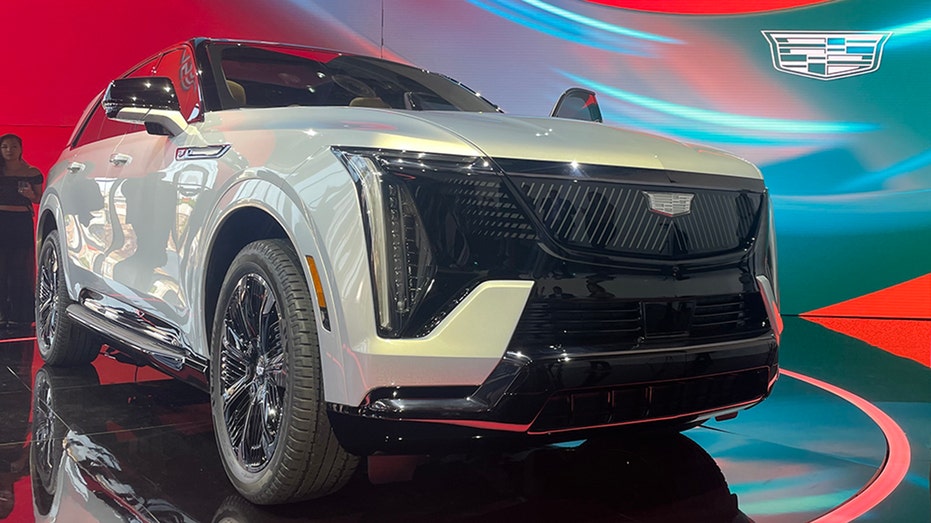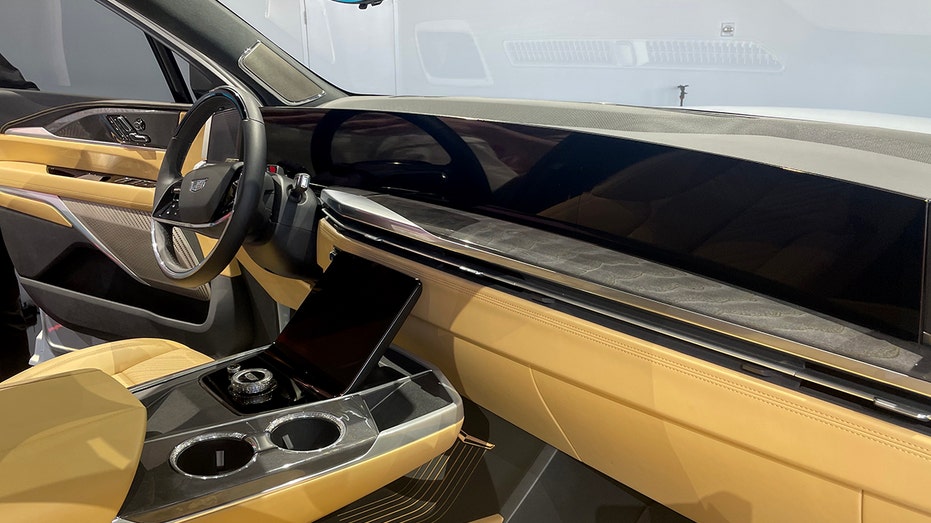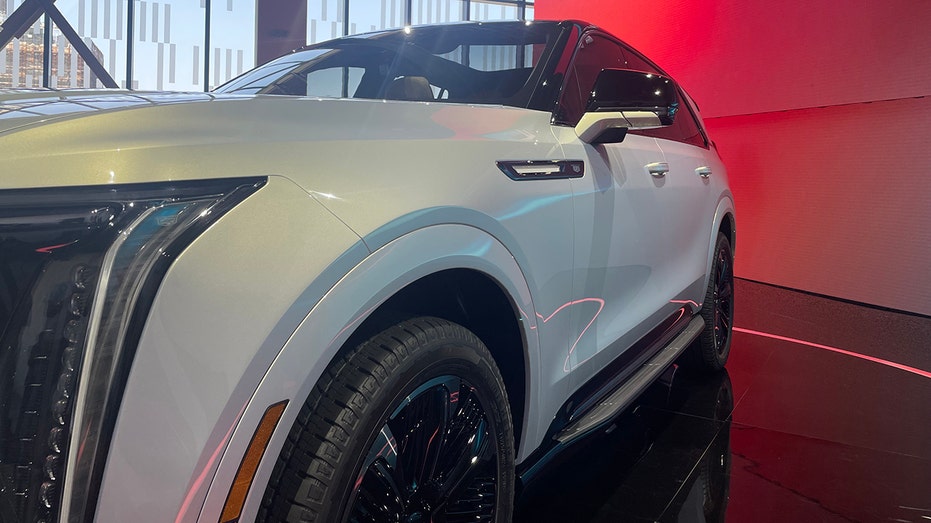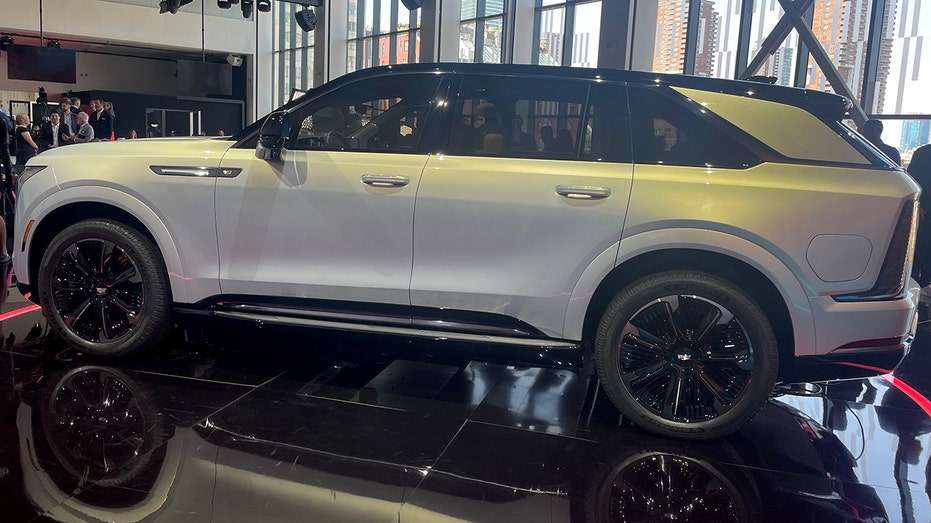Cadillac's Escalade IQ is its brand new $130,000 all-electric SUV
The Escalade IQ is the first of three EV models to be unveiled in 2023
2023 Escalade-V named the most powerful Cadillac to date
Gary Gastelu, automotive editor at Fox News, test drives the 2023 Cadillac Escalade-V at Raceway Park in Englishtown, New Jersey, on ‘Varney & Co.’
General Motors-owned Cadillac unveiled its first full-size all-electric SUV, the 2025 Escalade IQ, on Wednesday as automakers race to create electric fleets and the infrastructure to support them.
General Motors pledged in 2021 to make the vast majority of the vehicles it produces electric by 2035 and the entire company carbon-neutral, including operations, five years after that.
Its Cadillac division, which designs and builds luxury vehicles, is looking to become fully electric even sooner, by 2030.
The Escalade IQ, which has a starting price of $130,000, is being called the latest step in Cadillac's "all-electric future." Cadillac is one of several companies pushing for electrification despite concerns that the EV charging infrastructure isn't "robust enough to fully support a maturing electric vehicle market," according to the S&P Global Mobility.
MERCEDES ‘HAUTE COUTURE’ VEHICLE TARGETS UBER WEALTHY

The Escalade IQ, Cadillac's first all-electric full-size SUV, is set to begin production in summer 2024. (Daniella Genovese/Fox Business / Fox News)
Still, GM, along with other global automakers, pledged to transition away from internal combustion engines amid a push from the Biden administration to have over 50% of new vehicles sold in the U.S. to be electric by 2030 and to achieve net-zero emissions by 2050.
Cadillac is slated to start production on the Escalade IQ in summer 2024, with customer deliveries starting in late 2024. Once it hits production, it will become the third fully-electric vehicle offered by the luxury car manufacturer. It is also the first of three electric vehicles that will be unveiled in 2023 alone.
| Ticker | Security | Last | Change | Change % |
|---|---|---|---|---|
| GM | GENERAL MOTORS CO. | 84.24 | +0.94 | +1.13% |
The Escalade IQ unveiling follows Cadillac's debut of the 2023 Cadillac Lyriq, a fully-electric midsize luxury crossover that starts at about $60,000, and the Celestiq, Cadillac's individually handcrafted, all-electric sedan, which has a starting price north of $300,000.
The Escalade IQ, the first SUV built on GM's Ultimum electic vehicle platform, can go 450 miles on one charge. It can also charge to 100 miles of range within just 10 minutes and has vehicle-to-home bidirectional charging technology.
MERCEDES-BENZ RELEASING 'ACCELERATION INCREASE' SUBSCRIPTION FEE FOR ELECTRIC VEHICLES
The nimble SUV is also being marketed as a reimagined version of its most popular vehicle, the Cadillac Escalade. Cadillac has sold more than 1 million Escalades globally over the past two decades

The interior of the Cadillac Escalade IQ, the first full-size all-electric SUV. (Daniella Genovese/Fox Business / Fox News)
With a spate of more EVs on the road, the problem ahead is infrastructure for charging them.
The U.S. will need to see the number of EV chargers grow more than eight-fold by 2030, even when factoring in home charging, to match forecasted sales demand, according to S&P Global Mobility forecasts.
There are over 135,000 public chargers across the country, according to the Biden administration. However, there are only about 13,487 Level 3 charging stations (which can provide a significant charge in just minutes) in the U.S. today, according to S&P Global Mobility estimates. There are approximately 17,000 Tesla Superchargers, which are Level 3 chargers.
Cadillac unveils its first fully electric SUV
Cadillac unveils the Escalade IQ, its first fully electric EV and the first of three to be revealed this year.
Fast chargers can get a battery to 80% of its capacity in 20 minutes to one hour, making them optimal for travel corridors. They’re much quicker than 240-volt "Level 2" chargers that can take hours to fully charge the battery.
The National Renewable Energy Laboratory estimates that 182,000 fast chargers will be needed by 2030 "to enable long-distance travel and ride-hailing electrification and to support those who lack access to residential charging."
"We're all being told that we need to drive EV adoption, and we're going to stop selling internal combustion… but if the infrastructure isn't ready, that's a huge pain point," Alistair Weaver, editor in chief of automotive website Edmunds, told FOX Business.
GM President Mark Reuss agrees that it's a problem that isn't being solved fast enough.

The Escalade IQ has a starting price of $130,000. (Daniella Genovese/Fox Business / Fox News)
"People are worried about it, and they should be worried about it. Just like they're worried about the cost of some of the EVs that are coming out today. That's a real issue," Reuss told FOX Business during an interview Wednesday in New York City.
GET FOX BUSINESS ON THE GO BY CLICKING HERE
To help, Ford and GM decided recently to adopt Tesla’s EV charging connector, the plug that links an electric vehicle to a charging station. This means owners of electric vehicles made by the Detroit automakers will be able to charge their EVs at many of Tesla’s charging stations starting next year.
On top of that, seven major global automakers, including BMW Group, GM, Honda, Hyundai, Kia, Mercedes-Benz Group and Stellantis NV, are working on a new charging network joint venture that will "significantly expand access to high-powered charging in North America."
The companies said they will share in a multibillion-dollar investment to build "high-power" charging stations with at least 30,000 plugs in urban areas and along travel corridors by 2030.
"The infrastructure piece of this is difficult because you see things happening… is it happening fast enough? Probably not," Reuss said.

The Escalade IQ, the first SUV built on GM's Ultimum electic vehicle platform, can go 450 miles on one charge. (Daniella Genovese/Fox Business / Fox News)
The other piece is reliability of these charging stations, which Reuss said GM is also working on.
"I guess the way we approach that is positive incentivization to whoever is installing those to be up and online and running. … We have to do that. Otherwise, this is like a bad joke when you go show up to a power station and it doesn't work," Reuss said.
The Biden administration also said it is focused on investing billions to create a national network of 500,000 electric vehicle chargers along America’s highways and in communities. The administration said it is also investing in "advancing an industrial strategy to continue to build out the domestic EV and EV charging industry."
The Associated Press contributed to this report.






















